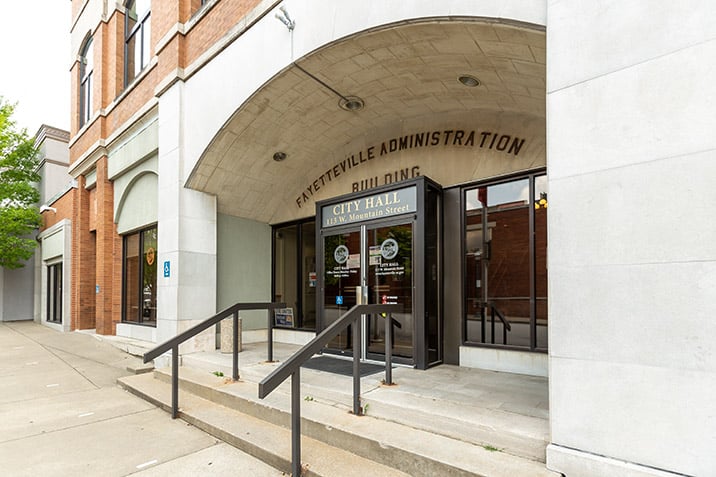 (Flyer photo/File)
(Flyer photo/File)FAYETTEVILLE — The City Council on Tuesday voted 5-3 against a proposal to move $1 million in earmarked park funds to the forthcoming housing crisis task force.
The proposal, presented by Councilmember Sarah Moore, aimed to earmark the remaining funds from the money provided by the federal government for pandemic revenue loss recovery. The money had previously been deposited into the city’s general fund and was originally earmarked by city staff for planned improvements at Walker Park.
Moore’s idea came after last month’s council decision to declare a housing crisis and initiate steps to address the issue, including forming a task force to recommend strategies for increasing housing supply and addressing housing insecurity.
The task force members have not yet been named, but are expected to be announced by Mayor Lioneld Jordan by the end of June.
During Tuesday’s meeting, Chief Financial Officer Paul Becker provided an extensive background on the earmarking of funds for Walker Park. He said in 2022, the city had identified a standard revenue loss reimbursement of $10 million, which was later adjusted to about $6.9 million. He said a series of workshops, public surveys, and council discussions that took place over the past two years all supported staff’s decision to allocate funds for infrastructure projects like the planned improvements to the park.
Becker said the earmarking process involved significant public input, with 489 respondents to surveys on infrastructure projects, including 84 specific responses about Walker Park. Becker also mentioned that the city’s Parks and Recreation Advisory Board had approved a master plan for Walker Park, which included the proposed improvements funded by the earmarked money. Those improvements were designed to enhance safety, visibility, and community engagement within the park, he said.
“There has been a substantial conversation about spending this money on Walker Park for quite a while,” Becker said.
Alison Jumper, the city’s director of parks, natural resources and cultural affairs, said the earmarked funds would partly go toward developing the park’s entryway from the west side, adding social spaces such as yard games, bocce ball courts, horseshoe pits, and a climbing boulder. Additionally, she said the proposed improvements incorporate Crime Prevention Through Environmental Design (CPTED) principles, which were developed in collaboration with the Police Department. Those measures include enhancing sight lines, improving lighting, and creating social spaces that foster community engagement and a sense of responsibility among park users. Jumper said the improvements aim to make the park safer and more inviting, ultimately contributing to a stronger, more connected community.
Councilmember Sarah Bunch questioned the feasibility of allocating funds to a task force that has yet to make any plans, and raised concerns about the potential ineffectiveness of the earmark if the task force could not reach a consensus about what to do with the money.
Similarly, Councilmember Scott Berna questioned the precedent for allocating funds to a task force or committee that has not yet been formed. Becker responded and said the city has never allocated money in such a manner, and that the city instead typically sets up a budget based on specific committee recommendations, which is then approved by the council.
Councilmember D’Andre Jones said he supports the master plan for the park, but reminded the council of the city’s need for housing solutions. He said the issue was not an either/or scenario but rather a matter of prioritizing immediate crisis management.
“We voted on a housing crisis and I think that we need to draw all of our attention to that crisis,” said Jones. “And we need to treat it like an emergency, treat it in the manner in which it deserves to be treated like we would treat any other crisis.”
Councilmember Bob Stafford agreed, and said there’s an urgency in addressing the housing crisis and criticized the narrative that prioritizing housing solutions would detract from park improvements.
“It’s not like if we do this, this part of Walker Park will never get improved,” said Stafford.
Councilmember Mike Wiederkehr expressed concerns about the broader implications of using the housing crisis declaration as a lever for continual funding requests. He said the housing crisis is a national issue, not unique to Fayetteville, and cautioned against repeatedly leveraging the crisis to secure allocations without first having any concrete plans.
“We approved the task force, now let’s let the mayor convene the task force and then move forward,” Wiederkehr said.
Wiederkehr was joined by Bunch, Berna, Teresa Turk and Holly Hertzberg in voting against the proposal, while Moore, Stafford, and Jones voted in favor.

